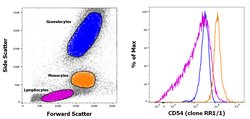Learn More
Invitrogen™ CD54 (ICAM-1) Monoclonal Antibody (RR1/1), Biotin, eBioscience™
Mouse Monoclonal Antibody
Supplier: Invitrogen™ BMS108BT

Description
Description: Recognizes the D1 domain of human CD54. Intercellular Adhesion Molecule-1 (ICAM-1) is a member of the immunoglobulin supergene family and functions as a ligand for the Lymphocyte Function-Associated Antigen-1 (LFA-1), an alpha-betacomplex that is a member of the leukocyte integrin family of cell-cell and cell-matrix receptors. ICAM-1 is a single-chain glycoprotein with a polypeptide core of 55 kD that can be expressed on non-hematopoietic cells of many lineages such as vascular endothelial cells, thymic epithelial cells, other epithelial cells and fibroblasts and on hematopoietic cells such as tissue macrophages, mitogen-stimulated T-lymphoblasts, germinal center B cells and dendritic cells in tonsils, lymph nodes and Peyer's patches. ICAM-1 is inducible on fibroblasts and endothelial cells by inflammatory mediators such as IL-1, TNF and IFN-gamma within few hours and is correlated to the infiltration of lymphocytes into inflammatory lesions. ICAM-1 seems to be the initial marker of inflammatory reactions and is expressed prior to, and to a greater extent than is HLA-DR. sICAM-1 serum levels were found elevated in acute renal graft rejection, insulin-dependent diabetis mellitus, anterior uveitis and in allergic inflammation. Applications Tested: Flow Cytometry. Purity: >95%.
ICAM-1 (CD54) is an 85-110 kDa single-chain type 1 integral membrane glycoprotein with an extracellular domain of five immunoglobulin superfamily repeats, a transmembrane region and a cytoplasmic domain. ICAM-1 has 7 potential N-linked glycosylation sites and shares considerable amino acid sequence homology with ICAM-3 (CD50) and ICAM-2 (CD102). ICAM-1 binds to integrins of type CD11a/CD18 (leukocyte adhesion molecule, LFA-1), or CD11b/CD18 (Mac-1) and is exploited by Rhinovirus as a receptor. ICAM-1 is expressed by activated endothelial cells and detected on epithelial cells, fibroblasts, chondrocytes, B lymphocytes, T lymphocytes (low), monocytes, macrophages, dendritic cells and neutrophils, with lower levels that increase upon inflammation. ICAM-1 is also detected in some carcinoma and melanoma cells. Soluble ICAM-1 is detectable in the plasma and is elevated in patients with various inflammatory syndromes.
Specifications
| CD54 (ICAM-1) | |
| Monoclonal | |
| 10 μL/Test | |
| TBS with 1% BSA and 0.02% sodium azide; pH 7.2-7.4 | |
| P05362 | |
| ICAM1 | |
| Affinity chromatography | |
| RUO | |
| 3383 | |
| 2-8°C | |
| Liquid |
| Flow Cytometry | |
| RR1/1 | |
| Biotin | |
| ICAM1 | |
| BB2; CD54; cell surface glycoprotein P3.58; Human rhinovirus receptor; ICAM; Icam1; ICAM-1; ICAM-1; CD54 homolog; Intercellular adhesion molecule 1; intercellular adhesion molecule 1 (CD54), human rhinovirus receptor; intercellular adhesion molecule-1; intercellular adhesion molecule-1 precursor; Ly 47; Ly-47; major group rhinovirus receptor; MALA2; MALA-2; MyD10; P3.58; sCD54; soluble CD54; Surface antigen of activated B cells | |
| Mouse | |
| 100 Tests | |
| Primary | |
| Human | |
| Antibody | |
| IgG1 |
The Fisher Scientific Encompass Program offers items which are not part of our distribution portfolio. These products typically do not have pictures or detailed descriptions. However, we are committed to improving your shopping experience. Please use the form below to provide feedback related to the content on this product.
